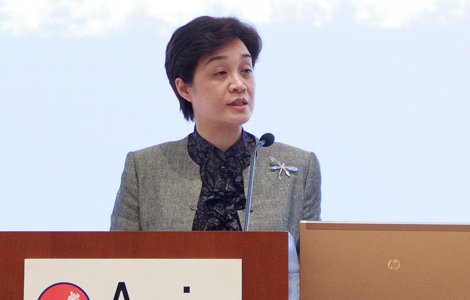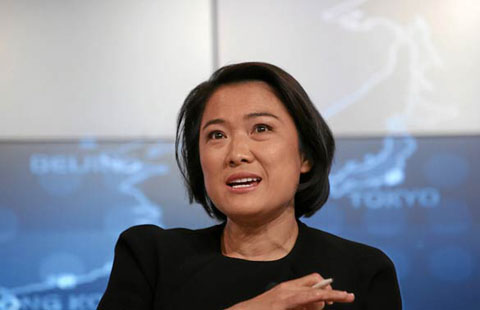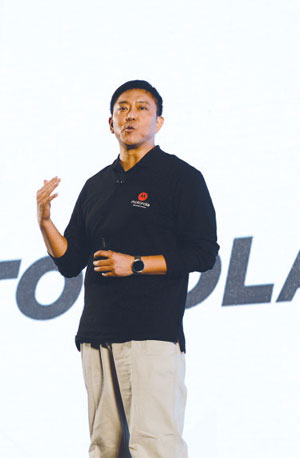Motorola to make phones in Tianjin
Updated: 2015-01-27 11:36
By Gao Yuan in Beijing(China Daily USA)
|
||||||||
|
Liu Jun, senior vice-president of Lenovo Group Ltd. Wei Xiaohao / China Daily |
Motorola Mobility LLP is saying "Hello Moto" once again to China, three years after abandoning the world's largest smartphone market.
Releasing an array of handsets, and now a Lenovo Group Ltd subsidiary, Motorola said on Monday that coming back to China and other emerging markets will help it become profitable.
Liu Jun, Lenovo's senior vice-president who heads the mobility unit, said it has already localized a number of Motorola applications, set up for Chinese buyers. The devices will pre-install a China-only navigation software, some utility apps and an app store operated by Lenovo.
Liu said the Moto devices will be initially manufactured in Tianjin municipality and in Guangdong province but there are also plans to move manufacturing to Central China's Wuhan, where Lenovo operates its largest phone and tablet assembly facility.
Motorola, headquartered in Chicago, quit selling phones in China more than a year ago after it was bought by Google Inc.
But since acquiring the company from Google for $2.9 billion early last year, Lenovo officials say they had been preparing Motorola to move back into more emerging markets.
Motorola will focus on the mid- and high-end sector in China, a market Lenovo has been finding hard to penetrate.
Liu said Motorola will not compete face-to-face with Lenovo-branded phones because the latter's major target customer group remains budget phone buyers.
Before reintroducing Motorola to China, Lenovo depended heavily on contract phone sales. But dramatic subsidy cuts from telecom operators have hurt sales.
According to research firm Analysys International, Lenovo remains in an intensive fight with Samsung Electronics Co Ltd and affordable phone maker Xiaomi Corp to claim the top position in China.
"We come to China as a challenger," said Rick Osterloh, Motorola's president and chief operating officer, as he pledged to offer buyers the chance to design their own gadgets.
An online customer design program named Motorola Maker allows buyers to choose both the material and color of their phone case as well as the storage space available inside their phone.
Wang Jingwen, a Shanghai-based analyst from Canalys China, said Lenovo also has the chance to cooperate with Google in producing Nexus products after the Motorola buyout. Google is updating the world's most popular smartphone OS Android, which is also used in Motorola and Lenovo handsets.
"More importantly, (after buying Motorola) Lenovo gains access to a large patent portfolio which will be very useful for vendor's overseas expansion," Wang said.
Motorola's new China strategy does not include its popular wearable technology, however.
The highly anticipated smart watch, the Moto360 - run on Google Inc's Google Wear operating system - is not currently available on the Chinese mainland, but Osterloh said it will be later this year.
Although the growth in smartphone sales slowed significantly last year, China remains the world's most valuable handset market.
A recent report from technology consultancy IDC said growing demand in smaller cities and increasing demand for fourth-generation telecom networks will provide new opportunities for smartphone vendors.
gaoyuan@chinadaily.com.cn

 Old photos of China's military parade
Old photos of China's military parade
 US, China expected to lead on climate talks
US, China expected to lead on climate talks
 Chinese high-court member discusses legal reform
Chinese high-court member discusses legal reform
 Northeastern US braces for 'crippling' blizzard
Northeastern US braces for 'crippling' blizzard
 At least 2 dead, dozens hurt after bus hits road barrier
At least 2 dead, dozens hurt after bus hits road barrier
 Red carpet of 21st annual SAG Awards in Los Angeles
Red carpet of 21st annual SAG Awards in Los Angeles
 New Year celebrated with dance mix
New Year celebrated with dance mix
 Businesswomen shine at the World Economic Forum
Businesswomen shine at the World Economic Forum
Most Viewed
Editor's Picks

|

|

|

|

|

|
Today's Top News
Expatriates to be lured for startups
Yahoo to spin off its 384m Alibaba shares
China opens its market to all US apples
Beijing gears up for Super Bowl
Rock-Paper-Scissors: Paper wins
10 million new jobs on way in China, Li vows
Obama's trip to India spurs triangle chatter
Chinese plan NJ's tallest building
US Weekly

|

|








